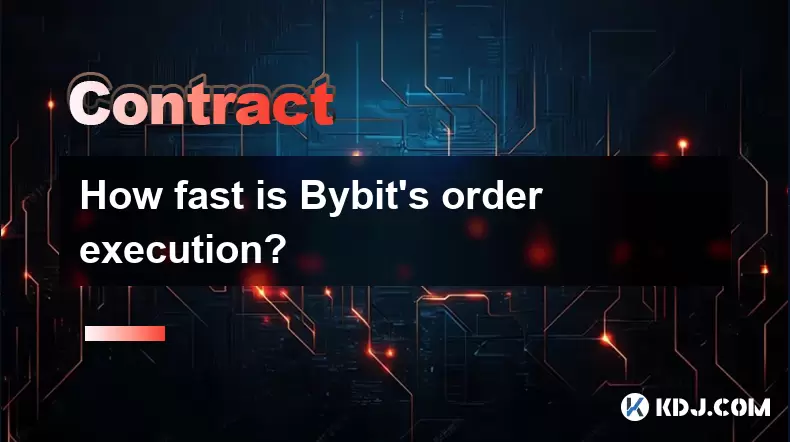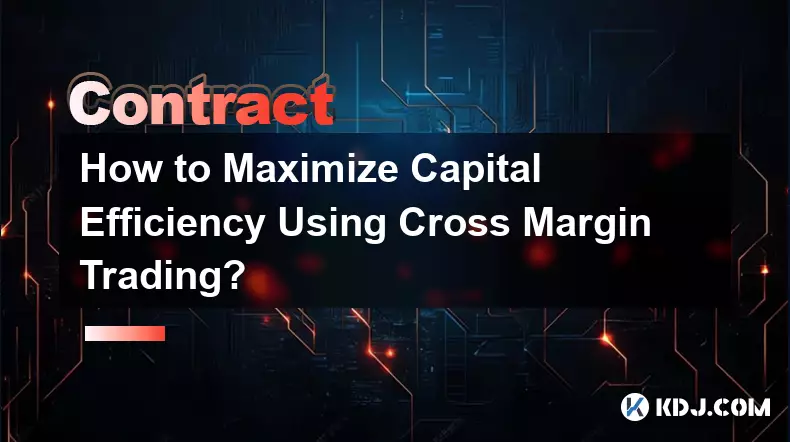-
 bitcoin
bitcoin $87959.907984 USD
1.34% -
 ethereum
ethereum $2920.497338 USD
3.04% -
 tether
tether $0.999775 USD
0.00% -
 xrp
xrp $2.237324 USD
8.12% -
 bnb
bnb $860.243768 USD
0.90% -
 solana
solana $138.089498 USD
5.43% -
 usd-coin
usd-coin $0.999807 USD
0.01% -
 tron
tron $0.272801 USD
-1.53% -
 dogecoin
dogecoin $0.150904 USD
2.96% -
 cardano
cardano $0.421635 USD
1.97% -
 hyperliquid
hyperliquid $32.152445 USD
2.23% -
 bitcoin-cash
bitcoin-cash $533.301069 USD
-1.94% -
 chainlink
chainlink $12.953417 USD
2.68% -
 unus-sed-leo
unus-sed-leo $9.535951 USD
0.73% -
 zcash
zcash $521.483386 USD
-2.87%
How fast is Bybit's order execution?
Bybit's order execution speed is optimized for high-frequency trading, with sub-millisecond response times under optimal conditions, ensuring fast and reliable trade processing.
Jul 22, 2025 at 07:49 pm

Understanding Order Execution Speed on Bybit
Order execution speed refers to the time it takes for a trade to be processed from the moment an order is placed until it appears in the exchange’s order book or fills completely. On Bybit, this process is engineered for high performance, leveraging a matching engine capable of processing over 100,000 orders per second. This technical capability ensures minimal latency, making Bybit's order execution among the fastest in the cryptocurrency derivatives market. The exchange uses co-located servers and low-latency network architecture to reduce delays between user input and trade confirmation.
For traders engaging in high-frequency trading (HFT) or scalping strategies, even millisecond differences matter. Bybit’s infrastructure supports sub-millisecond response times under optimal conditions. This means that when market conditions are stable and network connectivity is strong, users can expect their limit and market orders to execute almost instantaneously.
Factors Influencing Execution Speed
While Bybit's backend systems are optimized for speed, actual user experience may vary based on several external and internal variables. These include:
- User internet connection stability: A slow or unstable connection introduces lag before the order even reaches Bybit’s servers.
- Device performance: Running trading platforms on underpowered devices may delay order submission due to UI rendering lags.
- API usage vs. web interface: Orders sent through Bybit’s REST or WebSocket APIs typically execute faster than those placed manually via the browser.
- Network routing and geographical location: Traders located closer to Bybit’s primary data centers (primarily in Asia) may experience lower ping times.
To maximize execution speed, traders are advised to use dedicated API keys with WebSocket connections, maintain high-speed internet, and consider using virtual private servers (VPS) hosted near Bybit’s server clusters.
Measuring Real-World Execution Performance
Independent tests and community benchmarks have shown that Bybit consistently delivers order confirmation within 10 to 50 milliseconds under normal load. During periods of extreme volatility—such as major Bitcoin price swings or FOMC announcements—execution times may increase slightly due to higher message volume, but the system remains resilient.
Traders can verify execution speed themselves by:
- Using timestamp comparisons between local order initiation and receipt of an
orderCreateresponse via API. - Enabling logging in trading bots to record round-trip time (RTT).
- Monitoring filled order timestamps in the 'Order History' tab versus local clock time.
These methods allow precise measurement of how quickly Bybit processes individual trades. For algorithmic traders, integrating latency monitoring scripts into their bot frameworks helps detect anomalies in real time.
Optimizing Order Types for Faster Execution
Not all order types behave the same way in terms of speed and reliability. To achieve the quickest possible execution on Bybit, certain configurations are recommended:
- Use market orders when immediate fill is critical. These prioritize speed over price and are executed against existing liquidity.
- Place limit orders at or near the best bid/ask to increase chances of fast matching without slippage.
- Avoid post-only or reduce-only flags if speed is the priority, as these add validation steps that may delay processing.
- Enable IOC (Immediate or Cancel) orders when seeking partial fills quickly without lingering in the book.
Additionally, selecting the appropriate symbol matters. Highly liquid pairs like BTC/USDT or ETH/USDT perpetual contracts offer deeper order books and faster matching compared to less-traded assets.
API Configuration for Maximum Speed
For professional traders, direct API integration is essential for achieving the fastest execution. Proper setup involves multiple steps:
- Generate an API key with 'Trade' permissions only, avoiding unnecessary scopes that could introduce overhead.
- Connect via WebSocket v5 instead of REST for real-time order updates and reduced polling delays.
- Subscribe to private channels such as
order,position, andexecutionto receive instant feedback. - Set request headers correctly, including timestamp synchronization within 5 seconds of UTC.
- Use binary protocol support (if available) to minimize payload size and parsing time.
Example WebSocket request for placing a market order:
{ 'op': 'send', 'reqId': '12345', 'action': 'placeOrder', 'params': {
'category': 'linear',
'symbol': 'BTCUSDT',
'side': 'Buy',
'orderType': 'Market',
'qty': '0.01',
'timeInForce': 'IOC'
}}
This structure minimizes latency while ensuring compatibility with Bybit’s latest API version.
Handling Volatility and System Load
During flash crashes or sudden news events, exchanges often face surges in order flow. Bybit employs rate limiting and circuit breakers to maintain stability. Users should understand how these mechanisms affect execution:
- Rate limits are set at 60 requests per second per IP, adjustable upon verification.
- Burst capacity allows short spikes above this threshold without rejection.
- Orders submitted during congestion may queue briefly but are not dropped unless malformed.
- Liquidation engines operate independently, ensuring forced closures execute promptly even under stress.
Traders can monitor system status via Bybit’s official status page and adjust strategies accordingly. Pre-positioning limit orders near current prices acts as a hedge against delayed market order execution during volatile episodes.
Frequently Asked Questions
Does Bybit offer colocation services for institutional traders?Bybit does not publicly advertise traditional colocation services, but it partners with third-party VPS providers that host nodes in proximity to its Singapore-based data centers. Institutional clients can access dedicated infrastructure through Bybit Prime, which includes enhanced API throughput and priority support.
Can I test execution speed before live trading?Yes. Bybit provides a fully functional testnet environment where users can simulate real trading conditions. Access https://testnet.bybit.com, create a demo account, and use the same API endpoints with /unified/v3 paths to measure latency without financial risk.
Why did my market order take longer than expected to fill?Delays in market order execution usually stem from insufficient liquidity at the requested size rather than system slowness. If your order exceeds available depth at the best price, it will walk the book, causing multi-tier fills logged separately. Check the 'Transaction History' tab to see individual fill timestamps.
Is mobile app execution slower than desktop?The Bybit mobile app uses the same backend systems, but network stack inefficiencies and device throttling can add tens of milliseconds. For time-sensitive trades, especially large ones, using a computer with wired internet and API automation yields better consistency.
Disclaimer:info@kdj.com
The information provided is not trading advice. kdj.com does not assume any responsibility for any investments made based on the information provided in this article. Cryptocurrencies are highly volatile and it is highly recommended that you invest with caution after thorough research!
If you believe that the content used on this website infringes your copyright, please contact us immediately (info@kdj.com) and we will delete it promptly.
- Bitcoin Faces Liquidity Test Amid Shifting Institutional Support Landscape
- 2026-02-05 13:05:01
- Volkswagen Tayron R-Line 7-Seater: A New Era of Luxury Family SUV Hits India
- 2026-02-05 13:00:01
- AI, Crypto Bounties, and Human Labor: The Shifting Landscape of Work
- 2026-02-05 13:00:01
- Volkswagen Unleashes the Tayron R-Line: Pre-Bookings Now Live for Flagship Seven-Seater SUV
- 2026-02-05 12:55:01
- Bitcoin Drops Amidst Analyst Warnings and Shifting Market Sentiment
- 2026-02-05 09:40:02
- The Great Stablecoin Showdown: Systemic Risk, the GENIUS Act, and the Battle for Wall Street's Future
- 2026-02-05 12:55:01
Related knowledge

How to Manage Emotions and "Revenge Trading" in Futures?
Feb 05,2026 at 12:19am
Understanding Emotional Triggers in Futures Markets1. Market volatility directly impacts psychological states, often amplifying fear or euphoria based...

How to Analyze Market Sentiment Using the Fear and Greed Index?
Feb 05,2026 at 07:40am
Understanding the Fear and Greed Index1. The Fear and Greed Index is a composite metric designed to quantify prevailing emotional states among cryptoc...

How to Use Volume Profile to Find Key Futures Entry Levels?
Feb 04,2026 at 11:39pm
Understanding Volume Profile Structure1. Volume Profile displays the distribution of traded volume at specific price levels over a defined time period...

How to Trade Bitcoin Futures with 100x Leverage? (High-Risk Setup)
Feb 05,2026 at 11:00am
Understanding Bitcoin Futures Mechanics1. Bitcoin futures contracts represent agreements to buy or sell BTC at a predetermined price and date in the f...

How to Maximize Capital Efficiency Using Cross Margin Trading?
Feb 05,2026 at 12:40am
Cross Margin Trading Fundamentals1. Cross margin trading allows traders to use their entire account balance as collateral for open positions across mu...

How to Trade Crypto Contracts During Major News Events? (CPI/FOMC)
Feb 05,2026 at 09:59am
Understanding Market Sensitivity to Macro Data Releases1. Cryptocurrency futures markets exhibit pronounced volatility during U.S. CPI and FOMC announ...

How to Manage Emotions and "Revenge Trading" in Futures?
Feb 05,2026 at 12:19am
Understanding Emotional Triggers in Futures Markets1. Market volatility directly impacts psychological states, often amplifying fear or euphoria based...

How to Analyze Market Sentiment Using the Fear and Greed Index?
Feb 05,2026 at 07:40am
Understanding the Fear and Greed Index1. The Fear and Greed Index is a composite metric designed to quantify prevailing emotional states among cryptoc...

How to Use Volume Profile to Find Key Futures Entry Levels?
Feb 04,2026 at 11:39pm
Understanding Volume Profile Structure1. Volume Profile displays the distribution of traded volume at specific price levels over a defined time period...

How to Trade Bitcoin Futures with 100x Leverage? (High-Risk Setup)
Feb 05,2026 at 11:00am
Understanding Bitcoin Futures Mechanics1. Bitcoin futures contracts represent agreements to buy or sell BTC at a predetermined price and date in the f...

How to Maximize Capital Efficiency Using Cross Margin Trading?
Feb 05,2026 at 12:40am
Cross Margin Trading Fundamentals1. Cross margin trading allows traders to use their entire account balance as collateral for open positions across mu...

How to Trade Crypto Contracts During Major News Events? (CPI/FOMC)
Feb 05,2026 at 09:59am
Understanding Market Sensitivity to Macro Data Releases1. Cryptocurrency futures markets exhibit pronounced volatility during U.S. CPI and FOMC announ...
See all articles























![KING vs PAINIFY😳 (1v1 ZONEWARS) [FORTNITE TOKEN/WAGER] KING vs PAINIFY😳 (1v1 ZONEWARS) [FORTNITE TOKEN/WAGER]](/uploads/2026/02/05/cryptocurrencies-news/videos/origin_6984035326d58_image_500_375.webp)
![2/4 [U.S. Hot Search] CIA: Xi Jinping is a paranoid | Xi Jinping’s two phone calls | Shandong’s “Internet-addicted” teenagers rebelled against tyranny | A direct attack on the Chengdu hacker national team | Why GDP must grow by 5% | The bridge under construction by the China Railway 12th Bureau collapsed | Thousands of billions of dollars spent abroad and thirty billion domestic subsidies | 2/4 [U.S. Hot Search] CIA: Xi Jinping is a paranoid | Xi Jinping’s two phone calls | Shandong’s “Internet-addicted” teenagers rebelled against tyranny | A direct attack on the Chengdu hacker national team | Why GDP must grow by 5% | The bridge under construction by the China Railway 12th Bureau collapsed | Thousands of billions of dollars spent abroad and thirty billion domestic subsidies |](/uploads/2026/02/05/cryptocurrencies-news/videos/origin_69840a757417b_image_500_375.webp)

















































